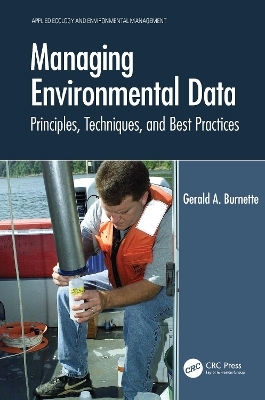
Managing Environmental Data
CRC Press (Verlag)
978-0-367-67592-9 (ISBN)
Focused on the mechanics of managing environmental data, this book provides guidelines on how to evaluate data requirements, assess tools and techniques, and implement an effective system. Moving beyond the hypothetical, Gerald Burnette illustrates the decision-making processes and the compromises required when applying environmental principles and practices to actual data.
Managing Environmental Data explains the basic principles of relational databases, discusses database design, explores user interface options, and examines the process of implementation. Best practices are identified during each portion of the process. The discussion is summarized via the development of a hypothetical environmental data management system. Details of the design help establish a common framework that bridges the gap between data managers, users, and software developers.
It is an ideal text for environmental professionals and students. The growth in both volume and complexity of environmental data presents challenges to environmental professionals. Developing better data management skills offers an excellent opportunity to meet these challenges. Gaining knowledge of and experience with data management best practices complements students’ more traditional science education, providing them with the skills required to address complex data requirements.
Gerald Burnette is a Senior Project Manager with Civil and Environmental Consultants, Inc. He earned a Bachelor of Arts in Mathematics (with a minor in Physics) from Maryville College in 1983. He has over 35 years experience in developing analytical and management applications related to land, ecosystem, and natural resources issues. He specializes in developing complex database management systems, including desktop and web interfaces. In addition to performing these services for numerous private clients, he has a long history of working for numerous state, local, and federal government clients. Notable examples include the US Army Corps of Engineers, the US Department of Energy, and NASA.
Contents
Acknowledgments ..................................................................................................... xi
About the Author ..................................................................................................... xiii
Chapter 1 About This Book .................................................................................. 1
Chapter 2 Data Management Concepts ................................................................. 5
PART 1 Environmental Data Management Principles
Chapter 3 Techniques for Data Management and Their Effectiveness ............... 17
Chapter 4 Relational Database Management System Basics .............................. 43
Chapter 5 Buy, Borrow, or Build: A Decision Guide for Choosing
between an Existing Solution and Creating Something New ................................. 97
Chapter 6 Designing and Building a Database ................................................. 111
Chapter 7 Creating the User Interface(s) .......................................................... 123
Chapter 8 Applying What We’ve Learned ........................................................ 147
PART 2 Environmental Data Management Realities
Chapter 9 Prolog ............................................................................................... 215
Chapter 10 Origins .............................................................................................. 217
Chapter 11 Birth .................................................................................................. 233
Chapter 12 Growth .............................................................................................. 245
Chapter 13 Maturity ............................................................................................ 267
Chapter 14 Rejuvenation ..................................................................................... 283
Appendix A Data Dictionary for the Database Developed in Chapter 8 ......... 303
Appendix B SQL Commands for Creating the Database and
Inserting Data ................................................................................................... 313
Appendix C Bibliography: References and Recommended Reading .............. 337
Index ...................................................................................................................... 339
| Erscheinungsdatum | 07.02.2022 |
|---|---|
| Reihe/Serie | Applied Ecology and Environmental Management |
| Zusatzinfo | 20 Tables, black and white; 39 Line drawings, black and white; 39 Illustrations, black and white |
| Verlagsort | London |
| Sprache | englisch |
| Maße | 156 x 234 mm |
| Gewicht | 453 g |
| Themenwelt | Naturwissenschaften ► Biologie ► Botanik |
| Naturwissenschaften ► Biologie ► Ökologie / Naturschutz | |
| Technik ► Umwelttechnik / Biotechnologie | |
| Weitere Fachgebiete ► Land- / Forstwirtschaft / Fischerei | |
| ISBN-10 | 0-367-67592-7 / 0367675927 |
| ISBN-13 | 978-0-367-67592-9 / 9780367675929 |
| Zustand | Neuware |
| Informationen gemäß Produktsicherheitsverordnung (GPSR) | |
| Haben Sie eine Frage zum Produkt? |
aus dem Bereich


